
Time Travel Stories That Explore What It Means To Be Human
Holly Smale Recommends Kate Atkinson, Octavia Butler, and More
The inspiration for Cassandra In Reverse came—as art sometimes does—from heartbreak, or something quite like it. A short but intense relationship that unravelled so quickly, and so unexpectedly, I was left reeling. What had gone wrong? Was it my fault? What could I have done differently?
Caught in a familiar, never-ending thought-loop, I spent months trapped inside my own head: obsessively re-running the entire relationship in enormous detail, looking for clues, searching for the point where it all went wrong. If I could just go back and tweak it—say the right thing, understand a facial expression I completely misinterpreted—would it have had a different ending? Would it, perhaps, not have ended at all?
As I worked through this familiar yet confusing process—carefully editing a memory and allowing my imagination to play out the consequences in detail—I slowly realized it was an idea for a book: a woman, gifted with the power of time travel, who initially uses it to try and fix her relationship. But, when I pitched it to my agent, she had a few understandable questions. Why would anyone become so hyper-fixated on a short-term relationship like that? Why obsess, and repeat, and re-run? Why not just… let go and move on?
The answer to that question came with my autism diagnosis, a few years later. As I grappled with understanding my own neurology properly for the first time, I realized that the way I thought and behaved was tied, inexorably, to the fact that I was autistic. The need to repeat, to loop, to hyper-fixate, to obsess, to examine, to study, to analyze: I did it because I was autistic. Thus, rather than being a time-travel book with an incidentally autistic protagonist, this was a protagonist who time travelled because she was autistic: because the very act of time travel was, on a macroscopic scale, a narrative version of what goes on in her brain anyway.
I think there’s a part of every human who wonders if editing a part of their life would make a difference to where they ended up. But, in using time travel to reflect my character’s internal workings, I was able to give Cassandra a way to show her distinct neurology, instead of just telling us.
So much of being autistic is in attempting—and often failing—to connect to the world around us, and time travel allows Cassie try, over and over again. It allows her to explore what it’s like to carry time with you—blessed, and cursed, with an intense long-term memory—and to see what life is like when you get a dress-rehearsal first. It allows her to search for love, just as I have searched, and to try to understand those around me, as I have also tried. And it allowed me, as the writer, to repeat, to loop, and to undo and redo, to my heart’s content.
My favorite books are those where character and plot become one and the same. And, while time travel has been done so many times, Cassandra in Reverse is, in many ways, simply autistic neurology writ large, which felt like a slightly new perspective worth bringing to the table.
The best time travel stories, for me, allow the writer to essentially explore what it means to be human, and the incredible books I have picked below do exactly that.
*
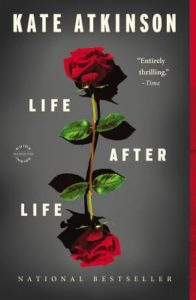
Life After Life by Kate Atkinson
In this beautiful novel, Kate Atkinson uses a form of time-travel to investigate the fragility of being alive in a warm, luminous and witty way. Ursula is consistently dying and being re-born—with each life repeating until she uses her memories (and often instinct) to send it in slightly different directions and make alternative choices. One of the biggest issues of writing a time travel book is making sure that the repetition isn’t boring for the reader, and this book does that sublimely. Every sentence is so beautifully and clearly observed, and its companion book (A God In Ruins) plays with an off-shoot of the same basic idea: where would we all end up if we got another chance?
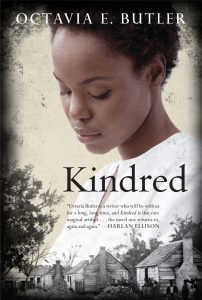
Kindred by Octavia Butler
An incredibly powerful novel, Kindred centers on the lives and experiences of slaves through the eyes of Dana—a Black woman living in 1976—who finds herself repeatedly pulled through time to the slave plantation of one of her ancestors in 1815. Time travel is used with enormous poignancy to explore race, gender and power dynamics through the eyes of a woman with modern sensibilities: a woman who cannot escape the time she has been thrown into, or the inevitable pain and struggle that comes with it. Every character feels alive, every story is explored and compassion is woven into every line: even for the brutal white plantation owners, who also seem caught in a time they cannot escape from. An astonishing book, as well as a vibrant and fascinating narrative that pulls the reader backwards in time along with its heroine.
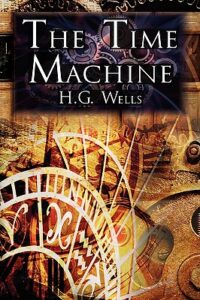
The Time Machine by H.G. Wells
No list about time travel would be complete without a nod to what is generally considered the first book to popularize the concept, as well as the first to coin the term ‘time-machine’. In his novella, H.G. Wells uses the eponymous Time Traveller—never given a name—to question the “fourth dimension,” and a human’s ability to travel through time as well as space. He uses time travel to move only forward, thus the book becomes a searing social dystopian examination of what human society—and the earth itself—will eventually become if it continues on the same path, and peers at the living standards of the working class through the lens of the underground Morlocks. Weird, dark, morbid but brilliant, this book opened up a brand new genre and still has enormous power.
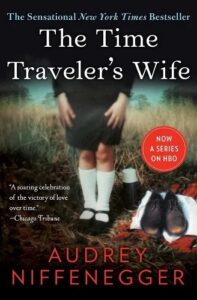
The Time Traveler’s Wife by Audrey Niffeneger
The focus of The Time Traveler’s Wife is love, predominantly from the perspective of the person who doesn’t time-travel: who is, essentially, left behind with the consequences. The connection between Henry, a man with a genetic condition that causes him to time-travel, and Clare—the woman he falls in love with—feels so real, as does the heartbreak, but it is the impact of waiting that really stands out: a sense of longing for a person, or a time, that has been or yet to come.
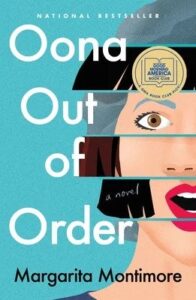
Oona Out of Order by Margarita Montimore
An incredibly entertaining and poignant novel, Oona is a unique character: one gifted—or cursed—with experiencing each year of her life in the wrong order: hopping forwards and backwards in time, and attempting to piece it together into one cohesive whole. It’s a novel that explores the impact our life choices have on us, externally and internally, and allows the characters to develop organically on the inside, even as her outside jumps around. It also has immense fun with technology, the use of ‘seeing the future’ to financially profit, and how foresight doesn’t necessarily prevent it all happening again, but this is a book that predominantly focuses on the importance of making mistakes, as well as embracing every age of being human.
__________________________________
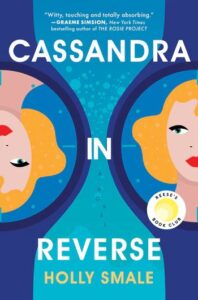
Cassandra in Reverse by Holly Smale is available from MIRA Books, an imprint of HarperCollins Publishers.
Holly Smale
Holly Smale is the internationally bestselling, award-winning author of the Geek Girl and The Valentines teen series, which have sold 3.4 million copies worldwide. In January 2021, Holly was diagnosed autistic at the age of 39. Suddenly a lot of things made sense. Holly regularly shares, debates about, and celebrates neurodiversity on Twitter and Instagram @holsmale.



















